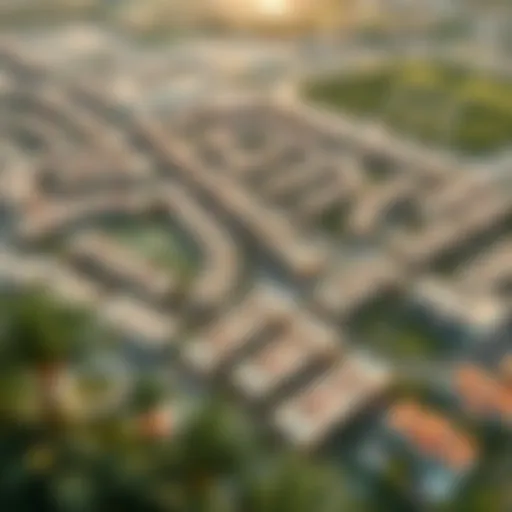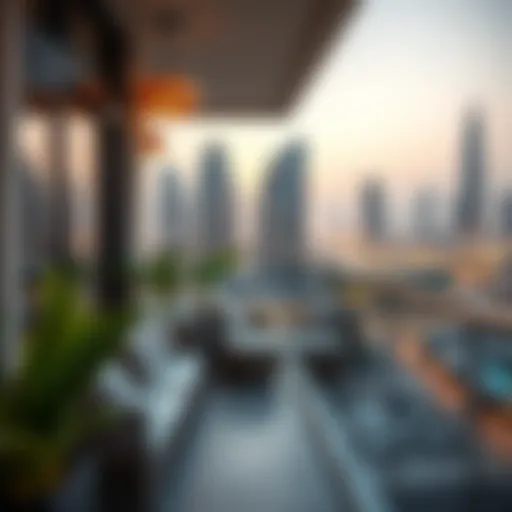Essential Guide to Iftar Timing in Dubai


Intro
As the sun begins to set over the iconic Dubai skyline, the anticipation for iftar—a meal breaking the fast during the holy month of Ramadan—grows among Muslims in the city. This sacred time is not just about nourishment; it carries a deep cultural significance steeped in tradition. Iftar time in Dubai is a social gathering, a moment to recharge one’s spirit and connect with family and friends. Each evening during Ramadan, the communal essence of iftar comes alive, framing both personal reflections and larger community interactions.
In this guide, we will unravel the intricacies of iftar timing in Dubai. Alongside exploring the local customs and traditional dining options, we will delve into how these cultural practices influence the real estate landscape. From family homes to investment properties, iftar has ramifications that ripple through various aspects of life in Dubai. This narrative is designed not just to inform, but to engage those with interests in real estate—be they investors, expatriates, or homebuyers—providing insights that might just shape decisions in a bustling market.
Understanding the timing of iftar is crucial as it aligns with prayer schedules and impacts community engagement during Ramadan.
Whether you're a local or new to the sand-swept city, this guide aims to enhance your comprehension of how iftar timing weaves itself into the fabric of Dubai, elevating your experience during this holy month. "Knowledge is the key," they say, and knowing when to break your fast may even unlock opportunities in social gatherings and property management.
Let's delve into market insights to understand how iftar timing stimulates various sectors, especially for those navigating the real estate market in Dubai.
Preamble to Iftar in Dubai
Iftar, the daily meal that breaks the fast during Ramadan, holds a prominent place in the heart of Dubai’s culture. It is not merely about consuming food; rather, it's an intricate tapestry woven with spirituality, community, and tradition. The city’s diverse population brings together various customs, making Iftar a unique event that reflects the values and heritage of the people living and working in Dubai.
The importance of understanding Iftar, particularly its timing, goes beyond the mere act of eating. For a lot of expatriates, homebuyers, and real estate investors, this timing connotes insights into local customs, social interactions, and communal bonds that are pivotal during the holy month. The act of gathering for Iftar can influence not just personal routines but also social dynamics across the Emirate.
The following sections will delve into the cultural significance of Iftar, illustrating how it ties into the broader spectrum of Ramadan practices. By exploring the meaning behind what may seem like a straightforward occasion, readers will gain a nuanced understanding of its implications at both personal and community levels.
Cultural Significance of Iftar
In Dubai, Iftar is a time for family, friends, and communities to gather, share stories, and reconnect after a day of fasting. The essence of the meal goes beyond sustenance—it symbolizes unity, compassion, and gratitude. In neighborhoods around the city, from the bustling markets to luxurious hotels, tables laden with traditional dishes become focal points for connection.
"> Iftar in Dubai showcases the beauty of sharing—a stark reminder of the communal spirit that Ramadan fosters. It’s not just about breaking bread; it’s about breaking barriers, forging friendships, and building community bonds."
The cultural richness is apparent in the variety of foods served, often reflecting the heritage of the diverse population. Such a blend includes everything from classic Emirati dishes like harees and stuffed dates to international cuisines brought by expatriates. This melting pot encourages culinary exchanges and marks the evening with a sense of global camaraderie.
Overview of Ramadan Practices
The practices surrounding Ramadan in Dubai are as varied as the city’s population. Each evening when the call to prayer echoes across the skyline, signaling sunset, the atmosphere brims with anticipation. Homes, mosques, and community centers become vibrant spaces filled with laughter, aromas of freshly prepared dishes, and the sound of heartfelt greetings.
During the Holy Month, rituals may include:
- Fasting from dawn until sunset: A time for self-reflection and spiritual growth.
- Special prayers (Taraweeh): Conducted in mosques, drawing large crowds.
- Charitable acts: Many engage in giving, highlighting the month’s emphasis on generosity.
Understanding these practices enriches the experience of Iftar. Investors and homebuyers can tap into this cultural landscape, which often influences property values and community dynamics. They often seek homes in neighborhoods with vibrant Iftar celebrations, reflecting a desire for community connection and cultural immersion.
Understanding the Timing of Iftar
Grasping the timing of iftar is like holding the compass in an ever-shifting desert; it points the way amid the beautiful chaos of Ramadan in Dubai. The significance of knowing when to break one's fast cannot be understated—it is not merely about satisfying hunger but about syncing with the celestial patterns that govern much of life in this vibrant city. In Dubai, where the days can stretch into a vast tapestry of bright sunlight, the timing for iftar serves as a pivotal moment for reflection, community, and celebration.


Astronomical Calculations for Iftar Timing
The essence of iftar timings in Dubai often rests on the calculations derived from astronomical data. Each day throughout Ramadan, the time at which the sun sets marks the moment when fasting ceases. The local authorities, through religious bodies, meticulously calculate the sunset using various tools that track the position of the sun.
For instance, many expatriates and locals rely on the Islamic Society of North America (ISNA) guidelines, which use precise latitude and longitude coordinates of Dubai. The traditional reliance on adhan—the call to prayer—further serves as both an auditory and temporal warning for the end of the day’s fast. DNAs of the sun’s movements during this month are etched into the very fabric of social behavior, guiding families towards their meal preparation. People are often eager to cease their fast as they listen closely to the call, counting down the remaining seconds, and this practice builds anticipation, weaving a thread of shared experience within the community.
Local Adjustments and Variability
Though astronomical calculations provide a robust framework, local customs can impact the specific timing of iftar. Different neighborhoods or communities might adopt slight variations based on local traditions or practices. For example, a family living in Dubai Marina may signal iftar a few minutes before another family in Jumeirah, where cultural nuances dictate their practices.
Moreover, factors like weather conditions can also alter how the sunset is perceived. If the sky is cloudy, a family may choose to wait a few moments longer to ensure that it's truly sunset before breaking their fast, indicating the interplay of modern science and traditional beliefs within the greater social fabric of Dubai.
"Understanding the intricacies of iftar timing transcends mere calendar awareness; it becomes a shared cultural rhythm that unites communities and bridges differences among residents."
Fret not if the time varies; this reflection of local norms demonstrates the richness of Dubai's multicultural landscape. Furthermore, developers and investors looking into the real estate market during Ramadan may find it beneficial to note these variations, as they impact community gatherings and family dynamics around the iftar table.
Thus, comprehending the timing of iftar in Dubai stretches beyond the clock—it is a lens into the city's soul, where community and shared experiences flourish.
Iftar Timing in Dubai: Month Overview
The month of Ramadan holds profound significance for Muslims across the world, and in Dubai, it transforms the rhythms of daily life significantly. Understanding the timing of iftar during this holy month is vital for both residents and visitors alike, especially for those interested in real estate or community involvement.
Properly grasping these timings assists in planning gatherings, optimizing cultural enrichment, and embracing the essence of this period.
Key Dates in Ramadan
Every year, Ramadan shifts due to the lunar calendar, resulting in different key dates. The first day of Ramadan generally starts with the sighting of the moon, which varies by locality. In Dubai, the anticipation builds as families and communities wait for this announcement. The key dates include:
- Beginning of Ramadan: Marks the start of fasting. This varies each year; in 2023, for instance, it could start on March 23.
- Mid-Ramadan: Reaching the halfway point often reflects a time for community engagement and charitable acts, well-loved in Dubai.
- Eid al-Fitr: The culmination of Ramadan, marking festivities and feasting, takes place after the 29 or 30 days of fasting.
Monitoring these dates is crucial for businesses and property owners, as local activities and community gatherings intensify, affecting real estate dynamics.
Daily Timing Variations
In Dubai, the timing of iftar varies daily throughout Ramadan, dictated by sunset. As the days progress, the timing can shift by a few minutes, and it's essential to keep informed. Here’s what to consider regarding daily variations:
- Sunset Times: Generally, you can expect iftar to occur between 6:30 PM and 7:00 PM during Ramadan, but these changes need to be tracked to avoid an awkward wait.
- Use of Technology: Many in Dubai utilize apps or websites that offer real-time updates for iftar times based on the geographical location.
- Cultural Observance: Local mosques and community centers often announce the iftar timing, embracing the communal aspect of breaking fast.
Being aware of these timing variations not only enhances personal scheduling but also offers valuable insights for those involved in real estate. For instance, understanding peak times for gatherings can influence property viewing schedules or the hosting of events.
Practical Aspects of Iftar in Dubai
Iftar, the meal that breaks the fast during Ramadan, is more than just a moment to satisfy hunger. In Dubai, it embodies a unique blend of cultural traditions, social gatherings, and culinary richness. Understanding the practical aspects of iftar can significantly enhance one's experience, whether you are a local, expatriate, or real estate investor keen on grasping the pulse of this vibrant city during Ramadan.


The importance of practical aspects of iftar lies in their role in community cohesion and interaction. Each evening, as the sun dips below the horizon, families and friends congregate to share meals, fostering bonds and strengthening relationships. Additionally, knowing where to partake in iftar or how to prepare at home can be pivotal for those wishing to immerse themselves fully in Dubai's Ramadan culture.
Recommended Iftar Venues
When it comes to recommended iftar venues, Dubai spoils you for choice. From lavish buffets in five-star hotels to modest local eateries, the options cater to all palates and budgets. Here are a few noteworthy spots:
- Al, Said Restaurant: Known for its authentic Arabic cuisine, it's a must-visit for a traditional iftar experience. Their lamb dish is particularly well-regarded.
- Rooftop Gardens at the Address Hotel: Offers an exquisite iftar with a view. Diners can relish dishes while enjoying a breathtaking sunset, making it a memorable experience.
- Local Mosques: Many mosques open their doors for community iftars, providing a warming atmosphere to break bread with locals. It’s a perfect way to immerse into the spirit of Ramadan.
Don’t forget to make reservations in advance, as many venues fill up quickly, especially as the Ramadan days draw nearer.
Home Preparation and Timing
For those opting for a home-cooked iftar, preparation is key. The kitchen becomes a bustling hub as families gather to whip up traditional delicacies, bringing everyone together in the process. Planning ahead can save a lot of last-minute stress.
- Timelines: Begin an hour or so before iftar. It’s important to have dishes ready to serve right at sunset. Remember to check local calendars for exact timings, as they can vary day to day.
- Menu: Typical iftar meals start with dates and water, followed by soups like lentil or chicken. Include a main course with rice and a protein to sustain energy for the evening.
- Decor: Setting up the dining area adds to the ambiance. Consider using traditional elements, like colorful tablecloths and candles, invoking the spirit of Ramadan.
"Breaking bread together is a tradition that transcends cultures and religions, making iftar a universal call to community and connection."
With thoughtful preparation, both at home and outside, iftar becomes not just a meal, but a cherished ritual that unites people in a special way.
Social Dynamics Surrounding Iftar
Iftar is more than just a meal; it’s a profound social event laden with cultural significance. In Dubai, the essence of iftar intertwines with the very fabric of the community, acting as a catalyst for social gatherings and communal ties. Understanding these social dynamics offers insights not only into the behaviors and practices during Ramadan but also highlights the broader implications for community cohesion and real estate interactions.
Family Gatherings and Community Events
Every evening, as the Maghrib call to prayer resonates through the air, families and friends come together to break their fast. This ritual transcends mere eating; it represents togetherness and shared experiences. Many families host iftar gatherings, which often extend to inviting neighbors and friends, fostering a sense of belonging and unity. These moments can be quite special, where laughter mingles with the aroma of traditional dishes like dates, samboosas, and harees.
"Iftar isn't just about food; it’s about breaking bread with the people you hold dear, fostering bonds that go beyond the daily hustle."
In addition to private gatherings, public iftar events are common in Dubai. Mosques and community centers often hold large iftar meals, welcoming anyone in the community regardless of their background. This inclusiveness often attracts expatriates, giving them a taste of local customs while providing an avenue to form connections. Such events also foster relationships among diverse groups, proving that food can serve as a bridge in a multicultural landscape.
Additionally, many businesses leverage the spirit of iftar by organizing corporate breaks for staff or provide iftar meals as part of community outreach efforts. This not only enhances employee morale but also generates goodwill within the local community, showcasing the holistic nature of Ramadan practices in Dubai.
Culinary Traditions During Iftar
Food is central to the iftar experience and symbolizes the cultural richness of the region. Traditional dishes hold significance and tell a story through their recipes. Dates are typically the first item consumed, following the Sunnah of the Prophet Muhammad. This simple act is more than sustenance; it connects individuals to their religious roots.
Here are some popular culinary traditions observed during iftar in Dubai:
- Dates and Water: The spiritual and physical refreshment that dates provide sets the tone for a rejuvenating evening.
- Samboosas: These delightful pastries, often filled with meat or vegetables, are a beloved starter, offering a burst of flavor and crispy texture.
- Thareed: A dish made of meat and vegetables served over flatbread, it symbolizes comfort and warmth, often bringing families together at the dinner table.
- Jalebi and Kunafa: These sweet dishes are frequently enjoyed as desserts, adding a sugary finish to the feast, and are simply irresistible.


The culinary traditions during iftar are expressive, often changing from one family to another, influenced by regional ingredients and cultural backgrounds. These meals create not just a dietary experience but an emotional one, filled with laughter and stories shared over cherished recipes.
In summary, the social dynamics surrounding iftar in Dubai reflect a tapestry of community spirit, deep cultural roots, and culinary richness. The close-knit gatherings during this time strengthen relationships and foster inclusivity, while the diverse culinary traditions ensure that everyone has a plate at the table, making this holy month a unique and enriching experience for all.
Impact of Iftar on Dubai's Real Estate Market
The significance of iftar during Ramadan goes well beyond just fulfilling the fasting requirement. In Dubai, where the population is a unique blend of cultures and traditions, the impact of iftar can be felt in various sectors, prominently in real estate. As families gather around the dinner table or restaurants to break their fast, a ripple effect is observed throughout the housing and rental markets.
Understanding this phenomenon helps real estate investors and homebuyers anticipate trends and make informed decisions.
Increased Demand for Properties
During Ramadan, there's often a noticeable uptick in the demand for residential properties in Dubai. Several factors contribute to this seasonal demand. Expatriates and families not only seek homes for prolonged stays but also consider properties closer to their community centers, mosques, and popular iftar spots.
- Family Considerations: Ramadan is a time for family gatherings, and many look for larger spaces to accommodate relatives who may be visiting.
- Cultural Attractions: With community events taking place, there’s often heightened interest in areas known for their festive activities, such as neighborhoods with renowned mosques or communal iftar settings.
- Investment Opportunities: Investors might see properties near popular iftar venues as high-potential investments, recognizing that demand during Ramadan can boost rental rates and property value.
Due to these factors, investors should keep an eye on the timing of these surges, seeking opportunities to acquire properties that meet the needs of this special season.
Short-Term Rentals During Ramadan
Rental markets in Dubai witness a surge, especially for short-term rentals, with many expatriates choosing to return to the city for the month of Ramadan. The enhanced demand for temporary accommodations translates into lucrative opportunities for landlords and property management companies.
- Flexibility for Renters: Short-term tenants benefit from flexible lease agreements, usually through platforms like Airbnb or local rental agencies, enabling them to enjoy iftar with family while still having all the comforts of home.
- Focus on Amenities: Properties that offer communal outdoor spaces, BBQ facilities, or those situated near popular iftar dining venues often see a spike in inquiries. Amenities that cater to families also become attractive, as shared meals around the table are deeply valued during the holy month.
- Pricing Strategy: Owners and property managers may adjust pricing strategies during this time. While they may charge premium rates for the convenience offered, it’s prudent to maintain competitive pricing to attract a steady influx of holiday renters.
Overall, the dynamics of demand for short-term rentals during Ramadan provide an interesting case for landlords and investors, prompting them to consider seasonal adjustments to their business models.
Culmination and Future Considerations
In wrapping up our exploration of iftar timing in Dubai, it is essential to recognize the deeper significance this practice holds in the cultural fabric of the city. Iftar is not merely a meal; it is a period of reconnection, reflection, and re-energizing after a day of fasting. The collective breaking of fast fosters a sense of unity, underscoring the communal values that are vital during Ramadan. For real estate investors, expatriates, and homebuyers, the nuances surrounding iftar timing can inform decisions ranging from property investment strategies to lifestyle choices while residing in such a vibrant city.
Understanding how iftar timings are calculated and observed provides a window into local customs and lifestyle preferences that could greatly influence property desirability. Being aware of the dynamics involving community gatherings, communal prayers, and market adjustments during Ramadan can help investors effectively gauge timing for purchase or rental arrangements.
Summarizing Iftar's Role in Dubai Culture
Iftar embodies the cultural identity of Dubai, marrying tradition with modernity. As the sun sets and the call to prayer rings out, families and friends come together to share a meal, reinforcing bonds that become essential during the holy month. Local restaurants and hospitality venues prepare elaborate traditions, offering a plethora of culinary delights that entice residents and tourists alike.
The timing of iftar not only influences dining preferences but also shapes social calendars, with many opting to host or attend iftar gatherings. This cultural observance has implications for how goods and services are consumed, hence, affecting the real estate landscape. Investors might find opportunities in properties that are strategically located near community hubs, where the social pulse of Ramadan is particularly strong.
"The heart of Dubai beats vividly during Ramadan; understanding iftar timing is key to grasping this vibrant rhythm."
Looking Ahead to Future Ramadan Trends
As the world evolves, so too do the practices surrounding Ramadan and iftar. Looking ahead, trends such as the integration of technology into these traditional practices will likely become more prominent. For instance, mobile apps that provide timely information about iftar timings could see a rise in usage among expatriates and smartphone-savvy residents eager to adhere to local customs while managing busy lives.
Environmental consciousness is another emerging trend, with many restaurants and households opting for sustainable practices in food sourcing and waste management during the month. This shift could influence dining venues' popularity, pushing property investors to consider the impact of sustainability on market trends.
Additionally, the role of social media in shaping Ramadan experiences cannot be underestimated. Platforms can amplify offers at local eateries and highlight neighborhood gatherings, creating demand for properties in areas known for vibrant Ramadan activities. As such, being attuned to these evolving dynamics will empower real estate stakeholders to make informed decisions, aligning their investments with the cultural and social currents that define Dubai’s ever-changing landscape.
Understanding these patterns opens the door for potential investment opportunities, enhancing the interplay between real estate and the cultural significance of Ramadan in Dubai.















